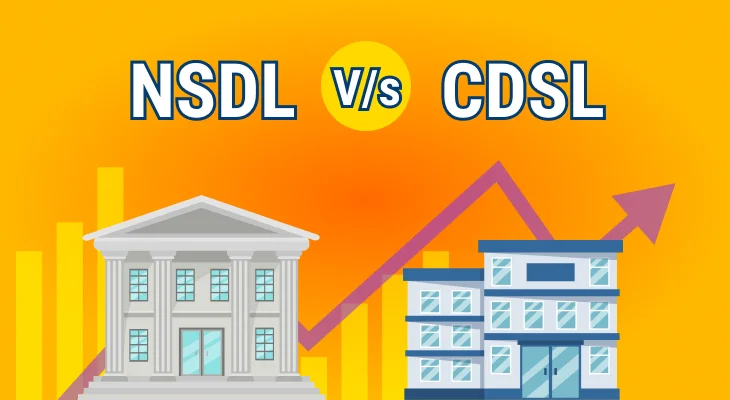NSDL V/s CDSL – A guide to Indian Depositories

In the Indian stock market, any shares that you purchase today will be held electronically, instead of physical share certificates, in a special account known as the demat account. Without the demat account, you cannot trade or invest in the Indian stock market. As of now, only two entities offer demat accounts in the country: the CDSL and the NSDL.
Here’s all you need to know about these two entities, including what they are and the differences between NSDL and CDSL.
What are the CDSL and the NSDL?
CDSL is an acronym for Central Depository Services Limited, whereas NSDL stands for National Securities Depository Limited. These two entities are known as securities depositories. They are responsible for issuing demat accounts, which are used to hold securities like stocks, bonds and mutual fund units electronically. Collectively, they work together to make the electronic transfer of securities possible.
How do depositories work?
Before we head to the section where we compare NSDL vs CDSL, here is a closer look at how these two entities work.
The primary function of these depositories is to issue demat accounts. However, as an investor, you cannot open a demat account by directly approaching NSDL or CDSL. Instead, you would have to go through an intermediary entity known as the Depository Participant (DP).
Once you’ve opened an account with a depository of your choice through a DP, you can proceed to purchase shares or other securities via the stock exchanges. When you buy securities, your depository credits them to your demat account within the settlement date. And when you sell securities, your depository debits the requisite number of securities that you sold from your demat account and credits it to the buyer’s account.
For every trade that takes place in the market, the depositories debit the seller’s demat account and credit the buyer’s demat account. As you may have realised by now, depositories play a vital role in the Indian stock market. They are pivotal to the practice of electronic trading in the country, which has replaced manual trading.
Differences between NSDL and CDSL
Although both the NSDL and the CDSL are securities depositories and work in the same manner, they do have a few dissimilarities. The differences between NSDL and CDSL have been tabulated below:
| Particulars | NSDL | CDSL |
|---|---|---|
| Year of Establishment | 1996 | 1999 |
| Founding Entities | National Stock Exchange (NSE), IDBI Bank and Unit Trust of India (UTI) | Bombay Stock Exchange (BSE) |
| Stock Exchange Association | National Stock Exchange (NSE) | Bombay Stock Exchange (BSE) |
| Demat Account Number Format | 14-digit number, prefixed by ‘IN’ | 16-digit number |
| Number of Depository Participants | 288 as of February 22, 2023 | 585 as of January 31, 2023 |
| Number of Demat Accounts Opened | Over 3.07 crores as of January 31, 2023 | Over 7.96 crores as of January 31, 2023 |
Note: Although a stock exchange is associated with a depository, it may also use the other depository to settle securities. For instance, the NSE may use the CDSL instead of the NSDL to settle traded securities.
List of services provided by CDSL and NSDL
Now that you’ve taken a good look at the comparison between CDSL vs NSDL, here’s an overview of some of the services offered by both depositories:
- Opening and maintenance of demat accounts
- Dematerialisation and rematerialisation of shares and other securities
- Settlement of trades
- Transfer of securities between demat accounts
- Off-market transfer of securities between demat accounts
- Transmission of securities
- Distribution of corporate actions like bonus share issues, mergers and share splits
- Demat account nominations
- Account opening
- Account statement
- Changing account details
Conclusion
With this, you must now be aware of what depositories are, how they function and the differences between NSDL and CDSL. As an investor, you don’t usually need to choose the depository when opening a demat account. Instead, it automatically depends on the depository your DP is associated with.
For instance, Mirae Asset Capital Markets (India) Private Limited is a registered DP of CDSL. So, when you open a demat account via the m.Stock online trading platform or the trading app, your account will be linked to CDSL.
However, since both the depositories work similarly, as an investor, you shouldn’t notice any difference in the overall trading experience.




